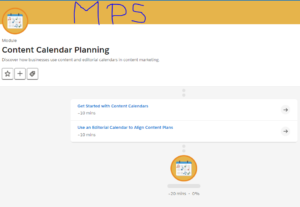In this tutorial, we will see the solution of a module called Content Calendar Planning. Discover how businesses use content and editorial calendars in content marketing. After solving this module you will get 100 out of 100 points. To check and solve the module click here.
If you want to learn about content calendar planning, so scroll down and learn it.
#1.Get Started with Content Calendar Planning
Solve Quiz and get +100 points
Q1)Why would an organization consider a static spreadsheet as a content calendar?
#I)It needs to manage large volumes of complex content.
#II)Multiple stakeholders need access to the calendar.
#III)Different products and types of content require multiple calendars.
#IV)The business has a simple content strategy and a small amount of planned content.
[bg_collapse view=”button-green” color=”#4a4949″ expand_text=”Show Answers” collapse_text=”Hide Answers” ] IV)The business has a simple content strategy and a small amount of planned content.[/bg_collapse]
Q2)Which of these are essential to using a content calendar?
#I)Rules that limit who can view the calendar
#II)A maintenance plan
#III)Ad hoc content creation
#IV)Regular press releases
[bg_collapse view=”button-green” color=”#4a4949″ expand_text=”Show Answers” collapse_text=”Hide Answers” ] II)A maintenance plan[/bg_collapse]
Check the Quiz to Earn 100Points
The second attempt earns 50 points. Three or more earn 25 points.
#2.Use an Editorial Calendar to Align Content Plans
Solve Quiz and get +100 points
Q1)What’s one example of how you would use an editorial calendar?
#I)To share a high-level view of content themes at a meeting
#II)To track compliance with brand guidelines
#III)To schedule the release of how-to blog posts
#IV)To track spending on content over time
[bg_collapse view=”button-green” color=”#4a4949″ expand_text=”Show Answers” collapse_text=”Hide Answers” ] I)To share a high-level view of content themes at a meeting[/bg_collapse]
Q2)Which of these are important items to include in an editorial calendar?
#I)Publication dates of social posts
#II)Word counts for blogs
#III)Themes tied to dates
#IV)Content outlines
[bg_collapse view=”button-green” color=”#4a4949″ expand_text=”Show Answers” collapse_text=”Hide Answers” ] III)Themes tied to dates[/bg_collapse]
Check the Quiz to Earn 100Points
The second attempt earns 50 points. Three or more earn 25 points.
FAQ:
What Is A “Content Calendar”?
A content calendar is a tool used by content creators to plan and organize their content. A content calendar can be used to plan out blog posts, social media posts, articles, or any other type of content.
A content calendar can help content creators stay organized and on track. It can also help content creators plan ahead and brainstorm ideas for new content. If you’re thinking about starting a content calendar for your own content creation, here are a few things to keep in mind.
When creating a content calendar, you will need to decide what format you want to use. There are many different formats you can use, but the most important thing is to choose a format that will work for you and your content.
Once you have chosen a format, you will need to decide what content you want to include in your calendar
Why To Use A Detailed Content Calendar?
Using a content calendar can help you effectively plan and organize your business’s content strategy. A content calendar can help you:
-detailed plan of your content
-more effectively market your business
-attract new customers
How To Create A Content Calendar For Your Blog?
Assuming you want a content calendar for your blog:
Decide how often you want to post. This will help you determine how much content you need to generate, and how much time you need to allocate to creating it.
What Is An Editorial Calendar?
An editorial calendar is a tool used by publishers and editors to plan and organize the content they need to produce. It is a way of mapping out what needs to be created and when it needs to be published.
What Is The Difference Between A Content Calendar And An Editorial Calendar?
Content calendars and editorial calendars serve different purposes. Content calendars are used to plan and track the content that will be published on a website or blog.
Editorial calendars on the other hand are used to plan and track the editorial content that will be published.
Why Have Editorial And Content Calendars?
There are a few key reasons for why having editorial and content calendars can be beneficial for businesses and organizations. By having a content calendar, you can better plan and manage your organization’s content strategy. This can help ensure that you are regularly publishing
List of Modules:
- Identity Management In Slack
- Protect Your Salesforce Data
- Develop A Heroku App That Integrates With Salesforce
- Prospecting For Better Sales
- One-On-One Meetings
- Innovation Customer Discovery
- What Is Innovation Basics
- Impacts Of The Fourth Industrial Revolution
- Healthy Eating With Salesforce’s Executive Chef
- Engagement And Retention
